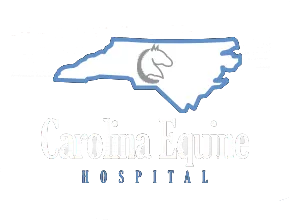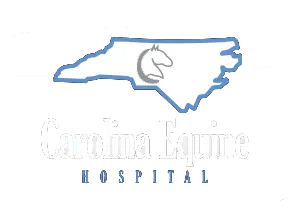Equine Enteric Coronavirus (ECoV) and Equine Biosecurity
- posted: Apr. 07, 2021
Equine Enteric Coronavirus (ECoV)
Equine Veterinarians are seeing an increased incidence of Equine Enteric Coronavirus (ECov), here in the Piedmont triad, statewide and nationally. As this disease becomes more prevalent in the equine population, the following information may become valuable to the horse owner:
•Relatively new disease in the equine population – reached national distribution in the United States around 2010-2011
•Recent, increasing incidence in the Piedmont Triad and elsewhere in the state and country
*****Not the same virus as Covid-19 (SARS-CoV-2) (see Helpful Links of Interest)*****
- No indication that either virus is transmissible between species
- Transmitted when a horse ingests fecal material from an infected horse
- Includes making oral contact with surfaces that are contaminated with infected feces (stalls, water buckets, feed bowls, hands and clothing of contaminated handlers)
- Can be spread from site to site by muck forks, manure spreaders, thermometers, tires, boots, tack, etc.)
- Incubation period is 2-4 days after exposure
- Most cases occur in winter and early spring
- Horses may shed virus for 15-25 days post infection
- Clinical symptoms are not required for shedding of virus in the feces
- Diagnosis based on clinical signs and testing of infected feces
Symptoms may include:
- Fever
- Decreased or absent appetite
- Colic
- Excessive lying down
- Diarrhea
- Depression
Many horses will show only mild symptoms and treatment is not required
If horses show more severe symptoms (dehydration, prolonged inappetence, persistent diarrhea) aggressive treatment is required,
O Fluid therapy (via stomach tube or intravenous)
o Anti-diarrheal medications
o Gastro-protectants
o Fever reducing medications (NSAIDS)
o Disease can affect many horses in a herd but has a low overall death rate
No vaccine available for ECoV – GOOD BIOSECUIRTY MEASURES ARE A MUST (see Biosecurity Measures and Helpful Links of Interest below)
https://cvm.missouri.edu/coronavirus-disease-in-horses-is-different-to-humans/
While equine biosecurity can be a daunting task, below are a few tips co consider when traveling with your equine companions.
1) Do not bring your horse to an equestrian event if your horse has active or recent signs of a potential infectious disease. This includes purulent (white or yellow) nasal discharge, cough, fever, diarrhea or enlarged submandibular (under the jaw) lymph nodes. If your horse has recently been ill, AVOID attending equestrian events for at least three weeks past resolution of all clinical symptoms.
2) While participating at equestrian events, monitor your horse’s rectal temperature twice daily, using a dedicated thermometer for each horse. Notify the veterinarian on call and the manager of the event if your horse develops fever of greater than 102 F, respiratory signs such as cough or purulent nasal discharge, neurologic symptoms, diarrhea or vesicular lesions along the gums and or coronary bands at an equestrian event.
3) Do not put horses in stalls that have not been properly cleaned and disinfected between uses.
4) Avoid tying up your horse in common areas and commingling near areas for disposal of manure or soiled bedding. Consider grazing in low traffic areas. Avoid nose to nose contact with other horses and letting other people pet, feed or touch your horse. Keep your contact with other horses at the event limited.
5). Wash your hands frequently. Supply a 65-70 percent alcohol gel hand sanitizer for your stall area. Use frequently and allow 10 seconds of contact time for gel hand sanitizers.
6) Avoid sharing group water troughs, and do not let your horse drink from the hose. Do not submerge the hose nozzle in the water when refilling water buckets.
7) Label your horse’s belongings, and DO NOT SHARE tack, bridles, halters, saddle pads, brushes, lip chains, twitches or oral paste medications.
8) Bring your own equipment to the event. Have separate water buckets, feed tubs, water hoses and stall cleaning equipment designated for travel. Clean and disinfect all equipment taken to the event including water buckets, stall cleaning equipment and wheel barrows (including wheels). Do not put this equipment back into the general circulation at your farm when returning home.
9) Clean and disinfect your truck and trailer after the event.
Remove all organic material from the interior and exterior surfaces of the trailer. Do not forget the tires of your truck and trailer.
Wash surfaces with a detergent, rinse thoroughly and then apply disinfectant. Allow the proper amount of contact time as recommended by the disinfectant’s labeled instructions prior to rinsing with water.
Recommended disinfectants include phenolic or accelerated hydrogen peroxide products. Alternatively, a 1:10 bleach to water dilution can be used; however, diluted bleach water will be ineffective in the presence of organic material (feces and dirt).
Wipe down the door handles and truck interior with alcohol wipes.
10) Keep up-to-date on vaccinations and deworming as recommended by your veterinarian. Check to see if vaccination records are required for entry or participation at the event you are attending.
11) Have a plan for isolating horses returning home from equestrian events from other resident horses on the farm if necessary. Separate paddocks or stabling (even temporary stabling) can be used for these horses if necessary, with a distance of 35 feet maintained from the resident horse population.
12) Check the equine disease communication center (www.equinediseasecc.org) to learn about areas of recent infectious disease outbreaks prior to traveling with your horse.
Location
Find us on the map
Browns Summit Location
5373 NC Hwy 150
Browns Summit, NC 27214, United States

